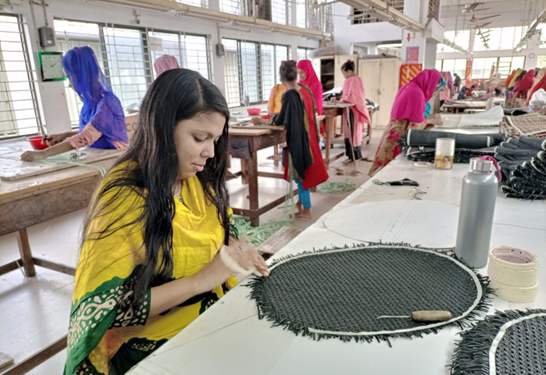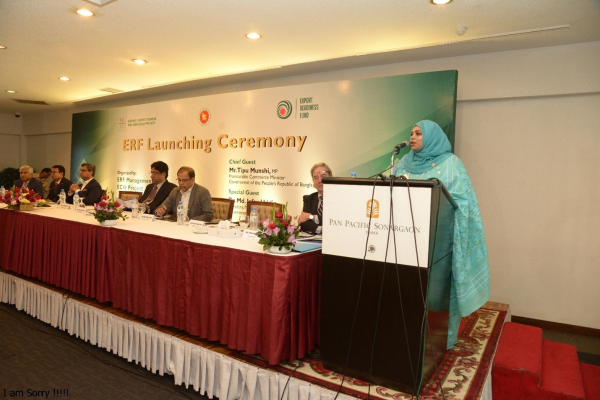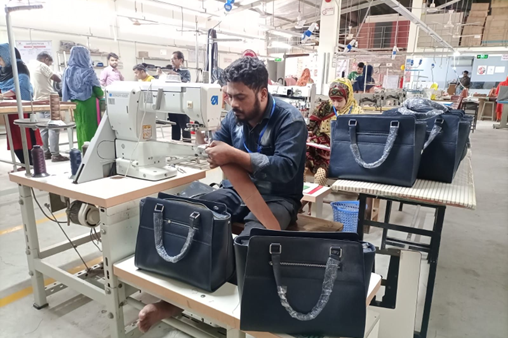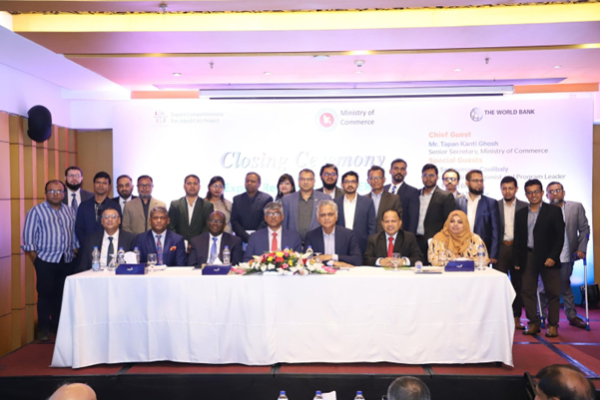Management of the Export Readiness Fund (ERF)
2019 - 2023
Export diversification is a key priority for the Government of Bangladesh, in order to continue to deliver accelerated growth, sustainable development, and increased job creation. In line with this, the Ministry of Commerce, Government of the People’s Republic of Bangladesh, has been implementing the Export Competitiveness for Jobs (EC4J) Project, financed by a loan from the World Bank.

The Export Readiness Fund (ERF) was a $17.5 million matching-grant programme and formed part of the EC4J project. Landell Mills, in association with Young Consultants, was the fund manager of the ERF.
The ERF provided grant-based incentives for advisory services, training, and equipment that enabled beneficiary firms to identify and address Environmental, Social and Quality (ESQ) compliance gaps; upgrade production processes; and improve product quality as required by international buyers and brands, and the regulatory standards of major export markets.
From September 2019 to November 2023, the ERF provided investment support under three funding windows (W1-3) to eligible Bangladeshi firms in the footwear, leather goods, plastic goods, and light engineering sectors to identify gaps, catalyse investment, and improve ESQ standards. Under a fourth window (W4), also known as the COVID-19 Enterprise Response Fund (CERF), the ERF supported the design, development, scale-up, and/or diversification of Bangladeshi firms that entered the market for or were producing Medical and Personal Protective Equipment (MPPE).
All four funding windows were established to enhance beneficiary firms’ competitiveness on the export markets, and grants were paid according to set milestones met. A total of 570 projects were approved across the four funding windows from 2019-2023.
Aimed to boost export growth
Through improving international compliance
853 ESQ-related training events delivered
Benefitting 10,761 employees, 35% of which were female
17% increase in female employees at beneficiary firms
From July 2021-June 2022

Increase in exporting status
Seven beneficiary firms that weren’t exporting prior to receiving ERF support have now started to sell their products abroad. Of these seven firms, three are in the plastic goods sector, two are in the footwear sector, and two are in the light engineering sector. The acquisition of new ESQ compliance certifications and the installation of upgraded capital machinery, both funded by ERF grant support, enabled the firms to sell their products abroad.
Entry into new markets
By November 2023, data from 92 exporting beneficiary firms showed that new clients, consisting of export markets and buyers, were found in 22 countries across 5 continents. Sectors that gained new exporters include footwear, leather goods, plastic goods, and light engineering. The acquisition of new ESQ compliance certificates and the installation of upgraded capital machinery, both funded by ERF grant support, enabled the firms to enter new markets. New buyers included large multi-nationals with strict standard requirements, such as H&M and Jack & Jones.
Creation of jobs
A total of 5,288 jobs were created at 106 firms from July 2021-June 2022, a 10% increase overall. Additionally, there was a 17% increase in the number of female employees working at the beneficiary firms, exceeding the initial target of 5%.
Acquirement of ESQ certificates
The ERF had an overall target to achieve 68 new ESQ certificates at beneficiary firms. By November 2023, beneficiary firms had obtained a total of 239 certificates for ESQ compliance systems, including:
- International Organization for Standardization (ISO) 9001, 14001, 45001, and 13485;
- Supplier Ethical Data Exchange (SEDEX);
- Business Social Compliance Initiative (BSCI);
- Customs Trade Partnership Against Terrorism (C-TPAT);
- CE marking; and
- HIGG Index.



Delivery of ESQ training
The ERF’s overall target was to deliver 68 ESQ-related training events for beneficiary firms. By November 2023, a total of 853 ESQ-related training events on topics such as environmental risk management, waste management, quality assurance, and occupational health and safety (including fire safety) had been conducted by W2-4 projects. A total of 10,761 employees benefitted from these training events, 35% of which were female.
Development of new products
A range of new products were developed by ERF beneficiary firms thanks to the funding they received, including plastic bobbins for thread reeling and different types of moulds for electronics, toys, household products, and bottles.
New products developed by firms who received W4 funding include surgical and protective masks, protective coveralls, and gowns; meltblown fabric for PPE apparel production; protective wear for various trades; and hand sanitisers and surface disinfectants for hospital and household use.
The development of new products helped with import substitution, as well as export diversification, further improving foreign currency reserves. Firms involved in import substitution can in turn progress into export of such products once they have achieved success within the local market.